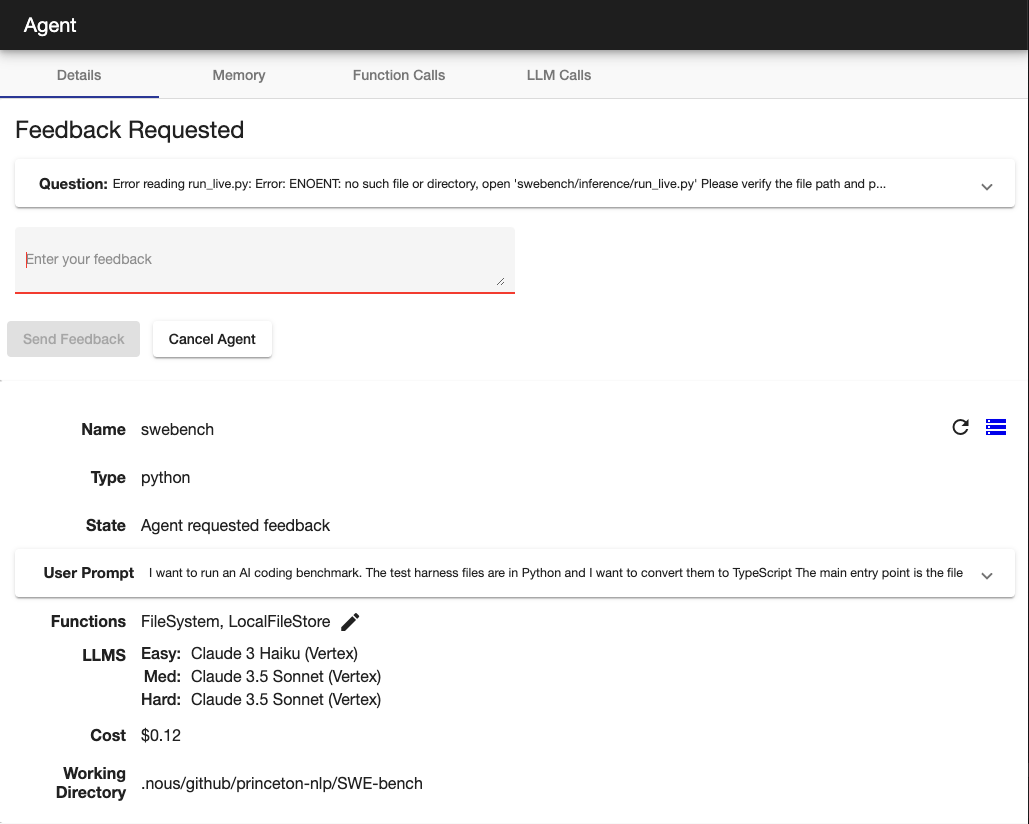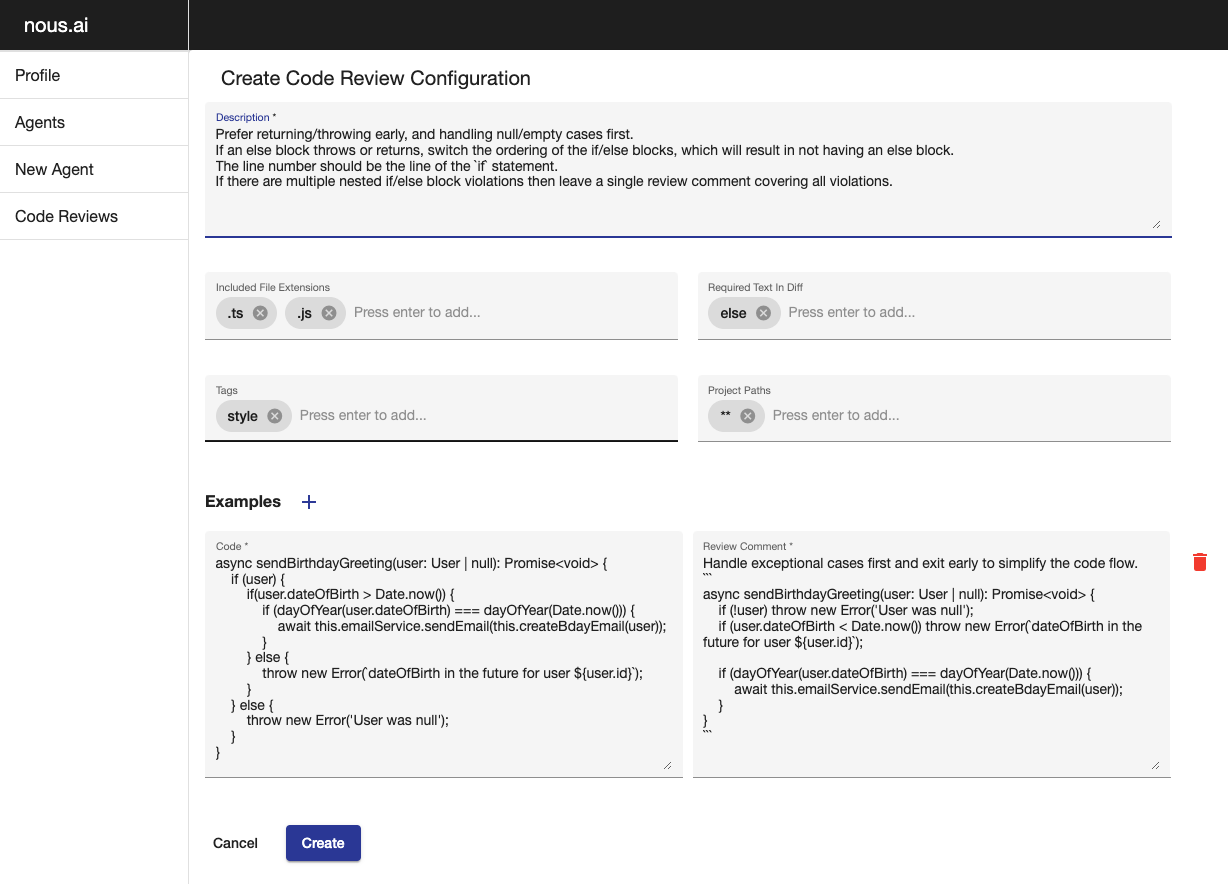Home
The open-source TypeScript platform for autonomous AI agents and LLM based workflows
Nous (Greek: νοῦς) is a term from classical philosophy often associated with intellect or intelligence, represents the human mind's capacity to comprehend truth and reality.
The Nous Story
Nous started from a simple goal: to harness AI's potential to enhance real-world productivity, born in DevOps and Platform Engineering space. We envisioned a tool that could:
- Automate various processes and support requests, and triage build failures.
- Review code for compliance with standards and best practices.
- Assist with large refactorings, and more.
At TrafficGuard we process billions of events a month for our global clients, increasing their Ad spend ROI from bots and other invalid traffic. Our platform on Google Cloud comprises projects developed in TypeScript, Python, GoogleSQL, PHP and Terraform, deployed from GitLab.
With open source projects typically Python/GitHub focused, and the vendor AI tools being focused in their silos, we saw a need for TypeScript based tooling which can work across our entire tech stack, and understand the overall architecture.
Through its evolution we've designed nous as a flexible platform for the TypeScript community to expand and support the use cases and integrations of your choice.
Our design choice of Firestore for the initial database implementation, with Cloud Run, provides a scale-to-zero solution with zero-cost using the free tier. With the intention to support uses cases such as your own custom personal assistant, always available via mobile.
Features
Some of the key features include:
- Advanced autonomous agents
- Reasoning/planning inspired from Google's Self-Discover paper
- Memory and function call history for complex workflows
- Iterative planning with hierarchical task decomposition
- Two LLM-independent function calling options:
- Custom XML-based function calling
- Sandboxed execution of generated code with multi-step function calling and logic
- Opportunistically can significantly reduce cost and latency compared to LLM-native/XML function calling
- LLM function schemas auto-generated from source code
- Function callable integrations:
- Filesystem, Jira, Slack, Perplexity, Gitlab and more
- Supports multiple LLMs/Services:
- OpenAI, Anthropic (native & Vertex), Gemini, Groq, Fireworks, Together.ai, DeepSeek, Ollama
- CLI and Web interface
- Human-in-the-loop for:
- Budget control
- Agent initiated questions
- Error handling
- Flexible deployment options:
- Run locally from the command line or through the web UI
- Scale-to-zero deployment on Firestore & Cloud Run
- Multi-user SSO enterprise deployment (with Google Cloud IAP)
- Observability with OpenTelemetry tracing
- Code Editing Agent:
- Auto-detection of project initialization, compile, test and lint
- Find the relevant files to edit and perform initial analysis
- Code editing loop with compile, lint, test, fix (editing delegates to Aider)
- Compile error analyser can search online, add additional files and packages
- Review the changes with an additional code editing loop if required.
- Software Engineer Agent:
- Find the appropriate repository from GitLab/GitHub
- Clone and create branch
- Call the Code Editing Agent
- Create merge request
- Code Review agent:
- Configurable code review guidelines
- Posts comments on GitLab merge requests at the appropriate line with suggested changes
UI Examples
New Agent
Sample trace
Human in the loop notification
Agent requested feedback
List agents
Code review configuration
Code Examples
Nous vs LangChain
Nous doesn't use LangChain, for many reasons that you can read online
Let's compare the LangChain document example for Multiple Chains to the equivalent Nous implementation.
LangChain
import { PromptTemplate } from "@langchain/core/prompts";
import { RunnableSequence } from "@langchain/core/runnables";
import { StringOutputParser } from "@langchain/core/output_parsers";
import { ChatAnthropic } from "@langchain/anthropic";
const prompt1 = PromptTemplate.fromTemplate(
`What is the city {person} is from? Only respond with the name of the city.`
);
const prompt2 = PromptTemplate.fromTemplate(
`What country is the city {city} in? Respond in {language}.`
);
const model = new ChatAnthropic({});
const chain = prompt1.pipe(model).pipe(new StringOutputParser());
const combinedChain = RunnableSequence.from([
{
city: chain,
language: (input) => input.language,
},
prompt2,
model,
new StringOutputParser(),
]);
const result = await combinedChain.invoke({
person: "Obama",
language: "German",
});
console.log(result);
Nous
import { llms } from '#agent/context'
import { anthropicLLMs } from '#llms/anthropic'
const prompt1 = (person: string) => `What is the city ${person} is from? Only respond with the name of the city.`;
const prompt2 = (city: string, language: string) => `What country is the city ${city} in? Respond in ${language}.`;
runAgentWorkflow({ llms: anthropicLLMs() }, async () => {
const city = await llms().easy.generateText(prompt1('Obama'));
const result = await llms().easy.generateText(prompt2(city, 'German'));
console.log(result);
});
The Nous code also has the advantage of static typing with the prompt arguments, enabling you to refactor with ease. Using simple control flow allows easy debugging with breakpoints/logging.
To run a fully autonomous agent:
startAgent({
agentName: 'Create ollama',
initialPrompt: 'Research how to use ollama using node.js and create a new implementation under the llm folder. Look at a couple of the other files in that folder for the style which must be followed',
functions: [FileSystem, Perplexity, CodeEditinAgent],
llms,
});
Automated LLM function schemas
LLM function calling schema are automatically generated by having the @func decorator on class methods, avoiding the
definition duplication using zod or JSON.
@funcClass(__filename)
export class Jira {
instance: AxiosInstance | undefined;
/**
* Gets the description of a JIRA issue
* @param {string} issueId - the issue id (e.g. XYZ-123)
* @returns {Promise<string>} the issue description
*/
@func()
async getJiraDescription(issueId: string): Promise<string> {
if (!issueId) throw new Error('issueId is required');
const response = await this.axios().get(`issue/${issueId}`);
return response.data.fields.description;
}
}
Contributing
We warmly welcome contributions to the project through issues, pull requests or discussions
Reach out to us as nous@trafficguard.ai if you'd like support to ramp up as a contributor.






